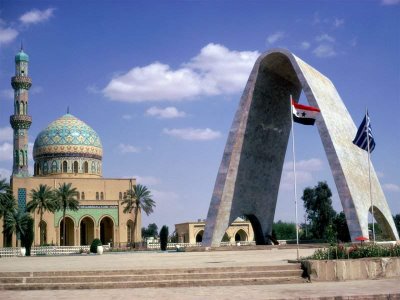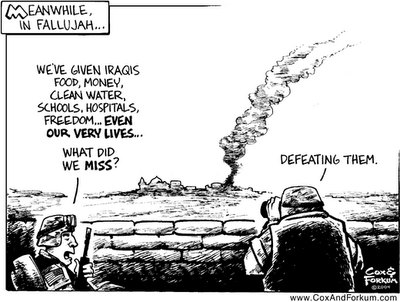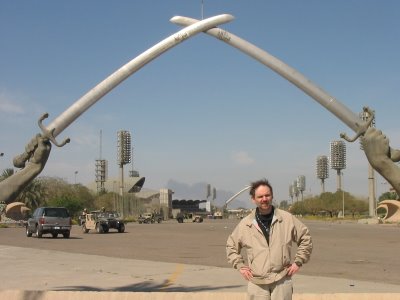
It's been said that the victor in a war is the one who makes the next-to-last mistake. Could leaving Iraq now be our last mistake? This article by Tony Blankley asks that very question:
Making the Last Mistake in Iraq
[...] We have the most profound obligation to attempt to calculate the consequences of the impending American decision to wash our hands of the Iraq unpleasantness. In that regard, the words of President Kennedy come to mind: "There are risks and costs to a program of action. But they are far less than the long-range risks and costs of comfortable inaction."
If we, the most powerful force on the planet, in a fit of disappointment and anger at our bungling policies to date, decide to shrug off our responsibilities to the future -- we will soon receive, and deserve, the furious contempt of a terrified world. In fact, even those Americans who today can't wait to end our involvement in the "hopeless" war in Iraq will -- when the consequences of our irresponsibility becomes manifest -- join the chorus of outrage. [...]
I have no doubt that the people in the West who have fought the hardest against this war will be the first to scream the loudest when the result of abandoning Iraq does us grave harm. And of course, they will accept no responsiblity for the sabatage they actively supported to bring it about.
[...] I have heard it said (by conservatives and Republicans, as well as others) that "if the Iraqis just want to murder each other, we should let them. We offered them freedom, and they didn't want it." If our decision on Iraq was only about Iraq, that argument might be persuasive.
But if, as it is hard to imagine otherwise, our departure from Iraq yields civil war, chaos, warlordism and terrorist safe havens -- it is very likely that Iran will lurch in to harvest their advantages, Turkey will send in its army to stop an independent Kurdistan, and Saudi Arabia, Egypt and the other Sunni states will be sucked in to fend off Shi'a Iran's hegemony. In that nightmare maelstrom the 20 million barrels a day of oil shipped from the Persian Gulf -- and the world economy with it -- will be in daily risk of being cut off.
Nor is that all. Al Qaeda and other terrorists are already gloating that they have whipped the "cowardly Americans" in Iraq. We will be seen (in fact, we are already beginning to be seen) as a weak reed for moderate Muslims to rely on in their hearts and mind struggle against the radical Islamists. Bin Laden was right in one regard: People fear and follow the strong horse; even more so in Middle Eastern culture, where restraint is seen as weakness and murder is seen as strength. [...]

We had a chance to crush and destroy murdering thugs like Muqtada al-Sadr, but we "restrained" ourselves. This caused them to lose all fear and respect for us, and has lead us to where we are now.
When Japan and Germany were defeated in WWII, they were occupied and CRUSHED. There was resistance, and it took years to reform them into self-sustaining democracies that were friendly with Western civilization.
In the times we live in, this has been made virtually impossible. Multiculturalism, political correctness and the large leftist/socialist movement in the West that perpetuates them has kept us with one hand tied behind our backs.
It's easy to be an arm-chair general. Things always look clearer with hindsight, but you don't get that until after mistakes are made. This was never going to be an easy task, and the outcome was always far from certain. Creating a viable Democracy in Iraq had many obstacles built into the situation. The goal was admirable, and still is, but where is the will to carry it through? Where is the RESOLVE? The resolve of the West? The Jihadists seem to have no problem with theirs.
Islam has not changed for centuries. This battle is not new. What is new, what has changed, is our perceived weakness, and the alliance of the Western politcal left in support of Jihadist movements.

From Ralph Peters article in the NY Post, "ARABIAN NIGHTMARES", is this very sobering assesment of our current position in Iraq:
[...] With the situation in Iraq deteriorating daily, sending more troops would simply offer our enemies more targets - unless we decided to use our soldiers and Marines for the primary purpose for which they exist: To fight.
Of course, we've made a decisive shift in our behavior difficult. After empowering a sectarian regime before imposing order in the streets, we would have to defy an elected government. Leading voices in the Baghdad regime - starting with Prime Minister Nouri al-Maliki - would demand that we halt any serious effort to defeat Shia militias and eliminate their death squads.
Killing Sunni Arabs would be fine, of course. The Maliki government's reason for being is to promote Shia power.
Reportedly, our CentCom commander, Gen. George Abizaid, just had a "come to Jesus meeting" (metaphor fully intended) with Maliki, warning him that our continued support is contingent on the government moving to impose public order and protect all of Iraq's people. The result is predictable: A few law-enforcement gestures by daylight, some reshuffled government appointments - and more sectarian killing.
From the Iraqi perspective, we're of less and less relevance. They're sure we'll leave. And every faction is determined to do as much damage as possible to the other before we go. Our troops have become human shields for our enemies.
To master Iraq now - if it could be done - we'd have to fight every faction except the Kurds. Are we willing to do that? Are we willing to kill mass murderers and cold-blooded executioners on the spot?
If not, we can't win, no matter what else we do. [...]
We had a chance to kill the enemy, but instead, we allowed ourselves to be pressured, to be "nice" and include them in the government. We were also pressured into giving authority to the Shia dominated Iraqi government too soon, before law and order and civil institutions were firmly re-established. I believe this pressure came from the Western political left with it's sabatage, constant political attacks and lack of support for our presence there and our mission. All of that encouraged the enemy and undermined our efforts.

If we leave now, what will we leave behind? The Democrat leadership now seems hell-bent on an exit strategy, with little regard to the consequences. I hope there are some Blue-Dog Democrats who understand what is at stake here. If you just cut and run, the danger will follow us. If Republicans and Democrats can work together in a bi-partisan manner (as they should have been all along), there may still be hope. Tony Blankley summed up the choice thus:
[...] We have only two choices: Get out and let the ensuing Middle East firestorm enflame the wider world; or, stay and with shrewder policies and growing material strength manage and contain the danger. [...]
(bold emphasis mine) If we leave now, we may have to do it all over again from scratch later, at much greater costs in every way. IF we even have the opportunity to do so; this may be the only window of opportunity. A nuclear Iran in the near future could change everything.
Of Tony Blankley's options, the later seems the more sensible, but will we, can we, muster the bi-partisan resolve to do it?
Will we heed JFK's warning about not doing anything?
No comments:
Post a Comment